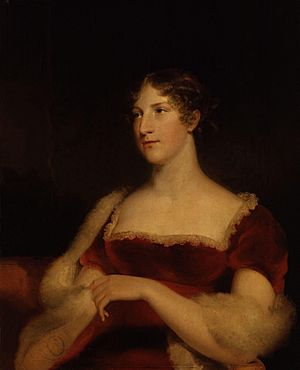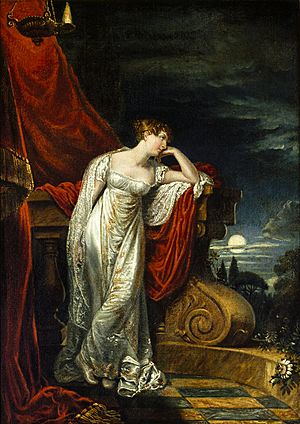Elizabeth O'Neill (actress) facts for kids
Quick facts for kids
Elizabeth O'Neill
|
|
|---|---|
 |
|
| Born | 1791 |
| Died | 29 October 1872 |
Elizabeth O'Neill (1791 – 29 October 1872), also known as Eliza, was a very talented Irish actress. She was famous for her amazing performances on stage, especially in serious plays.
Early Life and Career
Elizabeth O'Neill was born in Drogheda, a town in Ireland, in 1791. Her father was also an actor and worked as a stage manager, which means he helped organize plays behind the scenes.
Elizabeth first appeared on stage in 1811 at the Crow Street Theatre in Ireland. Her first role was the Widow Cheerly in a play called The Soldier's Daughter. After acting in Ireland for several years, she moved to London.
Becoming a Star
In 1814, Elizabeth O'Neill became a huge success in London. She played the role of Juliet in Romeo and Juliet at the Covent Garden theatre. People loved her performance!
For five years, she was one of London's favorite actresses. She was good at both funny plays (comedies) and serious plays (tragedies). However, she was especially brilliant in tragedies. Many people even compared her to the very famous actress Sarah Siddons, and they often said Elizabeth was just as good, if not better.
Later Life
In 1819, Elizabeth O'Neill married William Wrixon Becher. He was an Irish politician who served as a Member of Parliament (M.P.). Later, in 1831, he was given a special title and became a baronet.
After her marriage, Elizabeth O'Neill decided to stop acting. She never returned to the stage. She passed away on October 29, 1872.
Selected Roles
Here are some of the plays Elizabeth O'Neill performed in:
- Adelaide in Adelaide by Richard Sheil (1814)
- Adelgitha in Adelgitha by Matthew Lewis (1817)
- Florinda in The Apostate by Richard Sheil (1817)
- Zimra in Retribution by John Dillon (1818)
- Bellamira in Bellamira by Richard Sheil (1818)
- Urilda in Fredolfo by Charles Maturin (1819)
- Evadne in Evadne by Richard Sheil (1819)
See also
 | Shirley Ann Jackson |
 | Garett Morgan |
 | J. Ernest Wilkins Jr. |
 | Elijah McCoy |


